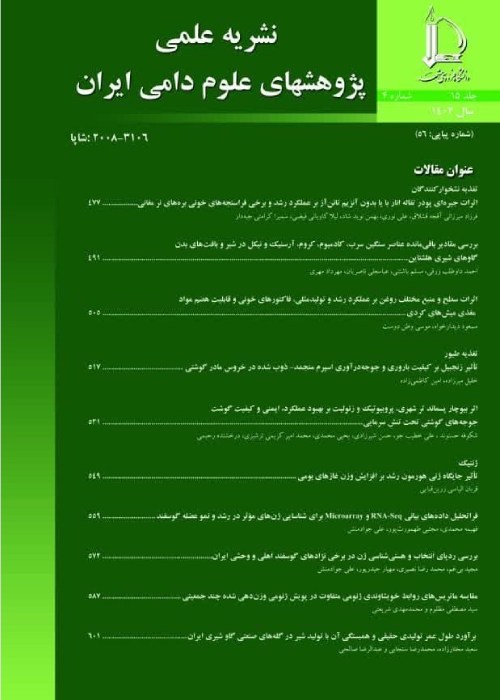Effect of Seidelitzia rosmarinus Decoction on Productive and Reproductive Performance of Fresh Holstein Dairy Cows
Author(s):
Article Type:
Research/Original Article (دارای رتبه معتبر)
Abstract:
Introduction
Recently, herbal additives have attracted interest for research due to their positive effects on animal health and production. The effects of herbal derived feed additives to their effects on rumen fermentation, gut microflora, immune system and the overall animal performance have been studied extensively and the observed results have been attributed to their antimicrobial, anti-oxidant, anti-inflammatory, immune regulatory and metabolic effects. Seidelitzia romarinus is one of the medicinal plants that has been used as forage in animal feeding for a long time. Although the nutritional values of halophytes such as S. rosmarinus are relatively good, they make palatable forage when mixed with other pasture plants. In addition, S. rosmarinus has some medicinal effects and used for the treatment of some diseases based on its antimicrobial and anti-oxidative effects. In traditional medicine, S. rosmarinus had been used extensively to attenuate the uterus problems after parturition especially for metritis prevention and treatment. Due to lack of any scientific evidences on the effects of S. rosmarinus on productive and reproductive performance of fresh cows, the aim of this study was to investigate the effect of Seidelitzia rosmarinus decoction on production and reproduction performance of fresh Holstein dairy cows.Materials and Methods
One hundred post-parturient Holstein dairy cows were allocated randomly to experimental treatments from their parturition day in a completely randomized design. The experimental groups were 1) control cows and 2) the cows that received the decoction of 500 grams S. rosmarinus for first 3 days after parturition. Milk yield and composition were recorded monthly for five months after parturition. Reproductive performance including conception rate, service per conception and metritis incidence were recorded for three months after parturition. In addition, a blood sampling was done from all cows on day 12 after parturition. All animals were examined at 3-week intervals by rectal palpation until spontaneous estrus. Artificial insemination (AI) was performed by an experienced inseminator with frozen–thawed semen 12 to 18 hours after observed standing estrus and pregnancy was determined using ultrasonography between day 40 and 48 after insemination.Results and Discussion
Milk production and composition of cows were not affected significantly by drinking S. rosmarinus decoction. The decoction of S. rosmarinus had positive effect on reproduction performance, so conception percentage of cows with lower than 100 days in milk and 100 to 200 days in milk increased when compared to control cows. Percentage of pregnant cows with 1 to 2 services per conception was higher for medical herb group. Percentage of cows with normal uterus in the decoction received group was higher than control cows, 70 % versus 50.14 %, respectively. Incidence of metritis decreased in cows received S. rosmarinus decoction (20 % versus 31.42 %, respectively). The observed effects from the S. rosmarinus decoction may be attributed to the antimicrobial effects of S. rosmarinus that prevented from new uterine infections or treated some sub-clinical metritis and therefore resulted in healthier uterine and better reproductive performance. Concentrations of blood glucose and non-esterified fatty acids were affected by drinking S. rosmarinus decoction so, the decoction received cows had higher glucose and lower non-esterified fatty acids levels. These blood parameters are the indicators of overall energy status of the cow and the observed results shoes that cows received S. rosmarinus had better energy status. Concentrations of blood cholesterol, triglyceride, total protein, albumin, urea, and beta hydroxy butyrate and blood enzyme activities including aspartate amino transferase and alkaline phosphatase were not influenced by drinking the herbal decoction.Conclusion
The results proposed that S. rosmarinus decoction may have positive effects on reproductive performance of fresh Holstein dairy cows.Keywords:
Language:
Persian
Published:
Iranian Journal of Animal Science Reaserch, Volume:14 Issue: 3, 2022
Pages:
333 to 343
magiran.com/p2513239
دانلود و مطالعه متن این مقاله با یکی از روشهای زیر امکان پذیر است:
اشتراک شخصی
با عضویت و پرداخت آنلاین حق اشتراک یکساله به مبلغ 1,390,000ريال میتوانید 70 عنوان مطلب دانلود کنید!
اشتراک سازمانی
به کتابخانه دانشگاه یا محل کار خود پیشنهاد کنید تا اشتراک سازمانی این پایگاه را برای دسترسی نامحدود همه کاربران به متن مطالب تهیه نمایند!
توجه!
- حق عضویت دریافتی صرف حمایت از نشریات عضو و نگهداری، تکمیل و توسعه مگیران میشود.
- پرداخت حق اشتراک و دانلود مقالات اجازه بازنشر آن در سایر رسانههای چاپی و دیجیتال را به کاربر نمیدهد.
In order to view content subscription is required
Personal subscription
Subscribe magiran.com for 70 € euros via PayPal and download 70 articles during a year.
Organization subscription
Please contact us to subscribe your university or library for unlimited access!


